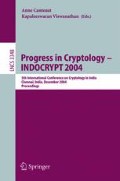Abstract
SHACAL-2 is a 256-bit block cipher with up to 512 bits of key length based on the hash function SHA-2. It was submitted to the NESSIE project and was recommended as one of the NESSIE selections. In this paper we present two types of related-key attacks called the related-key differential-(non)linear and the related-key rectangle attacks, and we discuss the security of SHACAL-2 against these two types of attacks. Using the related-key differential-nonlinear attack we can break SHACAL-2 with 512-bit keys up to 35 out of its 64 rounds, and using the related-key rectangle attack we can break SHACAL-2 with 512-bit keys up to 37 rounds.
This work was supported by the Ministry of Information & Communications, Korea, under the Information Technology Research Center (ITRC) Support Program.
Access this chapter
Tax calculation will be finalised at checkout
Purchases are for personal use only
Preview
Unable to display preview. Download preview PDF.
References
Biham, E., Shamir, A.: Differential cryptanalysis of the full 16-round DES. In: Brickell, E.F. (ed.) CRYPTO 1992. LNCS, vol. 740, pp. 487–496. Springer, Heidelberg (1993)
Biham, E.: New Types of Cryptanalytic Attacks Using Related Keys. Journal of Crytology 7(4), 229–246 (1994)
Biham, E., Dunkelman, O., Keller, N.: Enhanced Differential-Linear Cryptanalysis. In: Zheng, Y. (ed.) ASIACRYPT 2002. LNCS, vol. 2501, pp. 254–266. Springer, Heidelberg (2002)
Biham, E., Dunkelman, O., Keller, N.: Rectangle Attacks on 49-Round SHACAL-1. In: Johansson, T. (ed.) FSE 2003. LNCS, vol. 2887, pp. 22–35. Springer, Heidelberg (2003)
Handschuh, H., Naccache, D.: SHACAL: A Family of Block Ciphers, Submission to the NESSIE project (2002)
Handschuh, H., Knudsen, L.R., Robshaw, M.J.: Analysis of SHA-1 in Encryption Mode. In: Naccache, D. (ed.) CT-RSA 2001. LNCS, vol. 2020, pp. 70–83. Springer, Heidelberg (2001)
Hawkes, P.: Differential-Linear Weak-Key Classes of IDEA. In: Nyberg, K. (ed.) EUROCRYPT 1998. LNCS, vol. 1403, pp. 112–126. Springer, Heidelberg (1998)
Hong, S., Kim, J., Kim, G., Sung, J., Lee, C., Lee, S.: Impossible Differential Attack on 30-Round SHACAL-2. In: Johansson, T., Maitra, S. (eds.) INDOCRYPT 2003. LNCS, vol. 2904, pp. 97–106. Springer, Heidelberg (2003)
Kim, J., Moon, D., Lee, W., Hong, S., Lee, S., Jung, S.: Amplified Boomerang Attack against Reduced-Round SHACAL. In: Zheng, Y. (ed.) ASIACRYPT 2002. LNCS, vol. 2501, pp. 243–253. Springer, Heidelberg (2002)
Kim, J., Kim, G., Hong, S., Lee, S., Hong, D.: The Related-Key Rectangle Attack - Application to SHACAL-1. In: Wang, H., Pieprzyk, J., Varadharajan, V. (eds.) ACISP 2004. LNCS, vol. 3108, pp. 123–136. Springer, Heidelberg (2004)
Knudsen, L.R.: Trucated and Higher Order Differentials. In: Gollmann, D. (ed.) FSE 1996. LNCS, vol. 1039, pp. 196–211. Springer, Heidelberg (1996)
Langford, S.K., Hellman, M.E.: Differential-Linear Cryptanalysis. In: Desmedt, Y.G. (ed.) CRYPTO 1994. LNCS, vol. 839, pp. 17–25. Springer, Heidelberg (1994)
Matsui, M.: Linear Cryptanalysis Method for DES Cipher. In: Helleseth, T. (ed.) EUROCRYPT 1993. LNCS, vol. 765, pp. 386–397. Springer, Heidelberg (1994)
Selcuk, A.A., Bicak, A.: On Probability of Success in Linear and Differential Cryptanalysis. In: Cimato, S., Galdi, C., Persiano, G. (eds.) SCN 2002. LNCS, vol. 2576, pp. 174–185. Springer, Heidelberg (2003)
Shin, Y., Kim, J., Kim, G., Hong, S., Lee, S.: Differential-Linear Type Attacks on Reduced Rounds of SHACAL-2. In: Wang, H., Pieprzyk, J., Varadharajan, V. (eds.) ACISP 2004. LNCS, vol. 3108, pp. 110–122. Springer, Heidelberg (2004)
U.S. Department of Commerce. FIPS 180-1: Secure Hash Standard, Federal Information Processing Standards Publication, N.I.S.T. (April 1995)
U.S. Department of Commerce. FIPS 180-2: Secure Hash Standard, Federal Information Processing Standards Publication, N.I.S.T. (August 2002)
Author information
Authors and Affiliations
Editor information
Editors and Affiliations
Rights and permissions
Copyright information
© 2004 Springer-Verlag Berlin Heidelberg
About this paper
Cite this paper
Kim, J., Kim, G., Lee, S., Lim, J., Song, J. (2004). Related-Key Attacks on Reduced Rounds of SHACAL-2. In: Canteaut, A., Viswanathan, K. (eds) Progress in Cryptology - INDOCRYPT 2004. INDOCRYPT 2004. Lecture Notes in Computer Science, vol 3348. Springer, Berlin, Heidelberg. https://doi.org/10.1007/978-3-540-30556-9_15
Download citation
DOI: https://doi.org/10.1007/978-3-540-30556-9_15
Publisher Name: Springer, Berlin, Heidelberg
Print ISBN: 978-3-540-24130-0
Online ISBN: 978-3-540-30556-9
eBook Packages: Computer ScienceComputer Science (R0)

